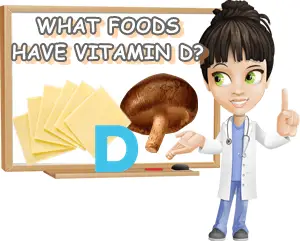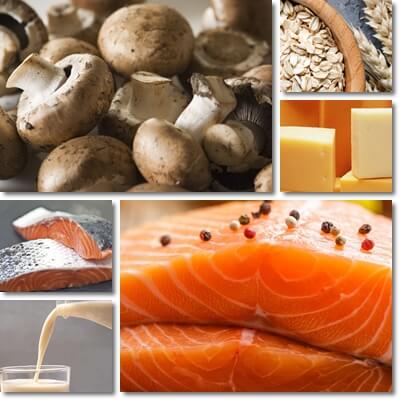Vitamin D is an essential micronutrient involved in regulating immunity, fertility, and mental health.
Vitamin D is important for bone density, teeth health, good sleep and has a proven anti-inflammatory action with potential benefits for pain management.
But where in the diet do you get vitamin D?
Vitamin D is the only vitamin you get from sun exposure.
The skin synthesizes vitamin D naturally from UV radiation from sunlight. But during winter, in areas where sun exposure is not an option, only two sources for getting your vitamin D remain: dietary supplements and foods.

Ideally, unless you have an extreme deficiency which absolutely requires supplementation to correct, it’s healthy to get at least some of your daily vitamin D from the foods you eat.
Vitamin D is not present naturally in most foods. In fact, there are only a few classes of foods that have vitamin D naturally.
Knowing what foods have vitamin D and, more important, what foods are HIGH in vitamin D can help you decide what to eat so you don’t develop a deficiency.
Just as important, there are different forms of vitamin D in foods, some more bioavailable than others, so the type of foods you choose to eat in order to get your daily vitamin D also matters.
For the most part, fish are an excellent food to get your vitamin D from.

What foods have vitamin D?
Animal foods are by far the best source of vitamin D.
Fishs have Vitamin D
Fish and seafood, and fish liver oils in particular, are naturally high in vitamin D.
For example, smoked and dried fish such as carp, salmon or eel provide between 170% and 190% of daily vitamin D values for an adult person per 100 grams.
But a single tablespoon full of cod liver oil has 170% of daily vitamin D requirements for an adult.
Cooked Fish Vitamin D Value
Cooked fish is also naturally high in vitamin D with 100% to 150% of daily values per 100 grams for varieties such as carp, eel, halibut, trout and rainbow trout.
Cooked mackerel, swordfish, salmon and sturgeon can get an adult person an average of 80% of daily vitamin D values.
See my list of fish high in vitamin D with the content of the vitamin and percentages of daily values.
Animal foods other than fish also provide decent amounts of the essential vitamin.
Eggs And Vitamine D
Eggs are by far the best choice.
A serving of 100 grams of eggs, whole, covers 27% of daily vitamin D values for the average adult person.
And 100 grams of egg is about two medium-sized chicken eggs, or less.
But not all parts of the egg have vitamin D.
Nowadays most people eat just the egg white because it’s naturally almost fat-free and very low in calories.
But know that egg white is pretty much devoid of vitamin D – as a fat-soluble vitamin, vitamin D occurs only in animal foods that are sources of fat and egg white is not.
That means that the yolk is where all the vitamin D content in eggs is found. Just in case you might have been thinking you could get away with only eating the egg white for vitamin D.
Learn more about the nutrition of egg white and compare with the nutrition of egg yolk.
Most meat also has vitamin D naturally. On average, you can get up to 3-5% of all the vitamin D you need in a day by eating 100 grams of meat, be it pork, chicken, veal, beef or another type. For example, a serving of 100 grams of duck, lean meat and skin with fat, can get the average adult 3.5% of their daily vitamin D values. Plain ground meat, ribs, sausages, ham and other byproducts all have vitamin D in them. But there’s a catch!
There is less vitamin D in lean meat only and more vitamin D in meat with fat. So before you discard all the fat on your meat for fear of calories and cholesterol, know that you are also removing most of the vitamin D in the meat. This applies to meat byproducts as well – meat byproducts with lean meat and some fat will get you a bit more vitamin D than very lean meat products.
Organ meats also have vitamin D. Liver in particular is a decent source. Beef liver, for example, can get you up to 6% of your daily vitamin D values for 100 grams. Skin is also a source of vitamin D with chicken skin providing an average of 3% of daily vitamin D values for an adult person.
See more benefits of chicken skin.
Milk, butter and fat are also minor sources of vitamin D, but generally don’t contribute much to daily values due to their very small serving size. For example, one tablespoon of chicken fat has a little over 3% of daily vitamin D values for an adult person. 100 grams of butter has just 2% of daily vitamin D values.
Buttermilk is a better source. A serving of 100 grams of buttermilk from whole milk can get the average adult 6.5% of all the vitamin D they need in a day. Processed cheeses on the other hand can be good sources of vitamin D. Processed American cheese can get the average adult person over 25% of all the vitamin D they need in a day for one 100 grams serving.
Colby cheese and cheddar cheese both have 3% of daily vitamin D values for every 100 grams. Monterey cheese and fontina cheese, muenster and gruyere also have 3% vitamin D. Whole milk mozzarella provides 2% vitamin D for every 100 grams.
Plant foods ranging from fruits and vegetables to nuts, seeds and grains don’t have any vitamin D in their natural form, but grains and byproducts such as flour, bread, bagels, donuts, biscuits and morning cereal are commonly fortified with vitamin D, and provide good amounts of it too.
Expect to find vitamin D in grain flours, morning cereals (wheat, oat, barley, corn, rice), but also plant milk and byproducts, infant formulas, baby food, rice patties, puffed grain products, fruit yogurt, protein powder, and various snacks such as energy bars, sports drinks, cereal bars, protein bars, hot chocolate, pudding, milkshake etc.
The only plant food that has vitamin D naturally are mushrooms. However, the content of vitamin D in mushrooms is generally fairly low and does not adequately cover daily requirements of the vitamin. Maitake mushrooms and farmed portobello or button mushrooms are the best sources of the vitamin.
A serving of 100 grams of raw maitake mushrooms can get the average adult 140% of all the vitamin D they need in a day, whereas farmed brown portobello mushrooms or cremini (crimini) have almost 160% of daily vitamin D values for the same amount. Farmed white portobellos, aka white button mushrooms, have around 130% vitamin D.
Despite claims, vegetable oils don’t have any vitamin D naturally. So if an olive oil company advertises their oil as being a source of vitamin D, know that it just isn’t so. Yes, a lot of cold pressed vegetable oils are healthy, especially extravirgin olive oil, but they don’t have vitamin D.
